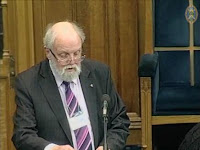
Reverend Alan Falconer presented the report on ecumenical relations to the General Assembly. He started by detailing the changes undergone in the past 5 years by most of the organisations addressing ecumenical relations (Churches Together in Britain and Ireland, The Conference of European Churches, The Community of Protestant Churches in Europe, the World Council of Churches, the World Alliance of Reformed Churches and Action of Churches Together in Scotland). Almost off of these bodies have undergone in some respect changes to their structures and policies. These changes have impacted the level of the debate carried with the Church of Scotland.
Rev. Falconer highlighted the work of the joint Commission on Doctrine with members of the Church of Scotland and the Roman Catholic Church which published a joint report on baptism as a study guide for local congregations. This informational pack includes an informational leaflet, PowerPoint presentations and the production of a joint liturgy for the reaffirmation of baptismal vows. The liturgy also had the contribution of members of the Scottish Episcopal Church.
There seems to be the development of growing trust between the Churches, stated Rev. Falconer which has been built over the years of work within the Joint Commission. This can be seen in the celebration of a symposium celebrating the 500 anniversary of the birth of John Calvin in 2009, where scholars from the Roman Catholic tradition presented papers attesting to the impact and importance of the work of Calvin and the reformation. “This type of symposium would have been unthinkable 50 years ago”, stated Rev. Falconer.
Rev. Falconer then proceeded to present in detail the activities undertaken with Action of Churches Together in Scotland (ACTS). Specific activities with each body were presented reiterating the overarching goal of supporting ecumenism within a vision of visible unit. The Kirk’s commitment to ACTS was reiterated in spite of the fact that financial contributions form ecumenical instruments in Britain and Ireland have diminished leaving the Church of Scotland as the larger contributor to ACTS. This position is not looked upon as healthy, stated Rev. Falconer. Questions arose as to the current financial commitment towards the funding of ACTS to the levels of what constitutes the salaries of 3 full time ministers.
A long discussion ensued on diverse interpretation of the sacrament of baptism, and the work that has been done at ecumenical level to produce joint resources for baptismal liturgy. These resources are currently available on a CD. Rev. Falconer stressed the importance of seeing baptismal regeneration as God’s sign of his Grace and a symbol of an individual’s entry into the Church and not just as a vehicle for ecumenical convenience.
The discussion moved to highlight that congregations of different denominations meet together to work and worship together whether there are formally stated ecumenical relationships, or whether because of geographical proximity and common interests, congregations decide to undertake joint projects even without formally sanctioned agreements. “We are all working together for the Kingdom of God” was expressed during the discussions that followed. Finally, representatives from different denominations spoke in support of the joint work being undertaken by the Kirk and their respective churches.


No comments:
Post a Comment